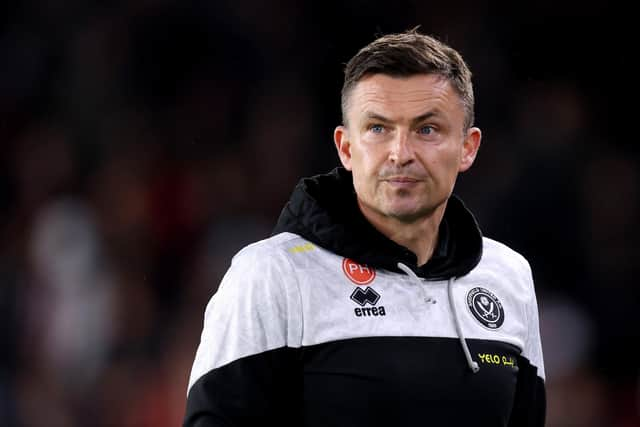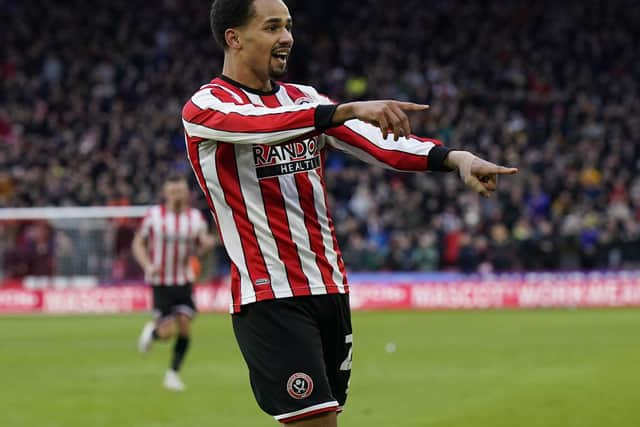James Shield: The step Sheffield United should take to give Paul Heckingbottom a break
and live on Freeview channel 276
Well, actually they didn’t. The gear, for reasons beyond the manufacturer’s control, didn’t actually get delivered for another few weeks. But in previous editions of this column, and elsewhere in The Star, we detailed why at the time.
After what has been a far more tumultuous and damaging week in the club’s history than many folk still seem willing to recognise, with the English Football League placing it under a transfer embargo for non-payment of a debt, the narrative surrounding the season has changed. Only subtly. Most conversations at Bramall Lane right now, with Paul Heckingbottom’s side ranked second in the table and 13 points clear of the Championship’s third placed team, still revolve around the prospect of winning promotion. But enough to potentially cause a distraction at a critical stage of the season. If you’re one of those who think I’m guilty of exaggerating then consider this: Why did Heckingbottom feel compelled to remind his squad that the EFL’s ruling, published just before they faced Hull City last week, must not become the catalyst for any loss of focus?


Advertisement
Hide AdAdvertisement
Hide AdAnyway, back to the thrust of this article. I’ve got a suggestion to make. It revolves around something else I wish United had brought back with them from Italy. The practice of ensuring a representative of a club’s board, or someone else tasked with running its day to day affairs, attends a weekly media briefing alongside the manager or head coach.
Over the past few months it has become increasingly obvious - although again, maybe because they wanted to curry favour or found it easier to look the other way - that United’s financial situation is pretty uncomfortable. Being banned from processing new signings, after failing to honour a debt owed to a rival team, is the latest in a series of symptoms which allow us to make this diagnosis. Others include delays to the installation and then opening of a training surface at the Randox Health Academy plus the fact Reda Khadra’s departure wasn’t immediately followed by an injection of fresh blood - something Heckingbottom had previously argued was a prerequisite if the German’s loan from Brighton and Hove Albion could be cancelled. And let’s not forget the fact that owner Prince Abdullah bin Musa’ad bin Abdulaziz Al Saud is in talks about a takeover, which could see him relinquish control, midway through a campaign which could end with United in the Premier League.
Heckingbottom has been questioned on all of these subjects of late, when he meets journalists from the local, regional and occasionally national media during his regular pre-match briefings. The United manager has done his best to answer them, often being forced to walk a fine line between providing as much information as he feels able to whilst still remaining respectful. To both those of us in attendance and also his employers.
But it isn’t Heckingbottom’s job. He should be probed on things like tactics, injuries and targets. In other words, matters relating directly to football. Enquiries about United’s business and budgets, although Heckingbottom likes to “manage up as he puts it”, should be dealt with by those whose responsibilities include such subjects.


Advertisement
Hide AdAdvertisement
Hide AdIn some other competitions, including Serie A, an administrator, director or senior executive also takes part in these sessions to provide a more detailed insight. Adopting this idea in England would benefit everyone concerned. Heckingbottom and his counterparts could concentrate on sport. Reporters would be able to gain greater insight without putting them in often impossible situations. In turn, this would prevent any misunderstandings which might cause everyone a problem. Fans - the people who we’re always told are the most important people in all of this - would also welcome the greater transparency. It wouldn’t be a solution to every difficulty football faces, as recent events at Juventus demonstrate. But a step in the right direction for everyone concerned? Most definitely.
•Tomorrow, United face Wrexham in the fourth round of the FA Cup. I get the argument that progressing might not help their bid to reach the top-flight. But I still think it’s nonsense. Yes, playing more games might increase the risk of injury to key players. So perhaps, with this in mind, we better ban United from training because they can get hurt doing that too.
There are individuals at Heckingbottom’s disposal who could benefit from games. Good individuals with plenty of talent. Qualifying for the later stages of the competition would enable United’s coaching staff to ensure they are properly match sharp.


•Earlier this week, I read somewhere on social media that handing Iliman Ndiaye a contract worth around £4m or £5m a year, (I can’t remember which figure it was or find the post concerned), might cause a problem in United’s dressing room when the Senegal international’s colleagues realise what he is on. In my experience, nothing could be further from the truth. Yes, footballers are concerned about pay scales within the camp. But if someone is on a mint, and they’re delivering on the pitch, then I’ve never known them to complain. Because they all basically know each other’s worth. The only time drastically increasing someone’s salary can be a source of strife is when the person concerned doesn’t deliver or isn’t that rated. United can’t match what Ndiaye is likely to soon be offered elsewhere. But the notion that his team mates would get the hump if his money is bumped up is misguided and simply wrong.
